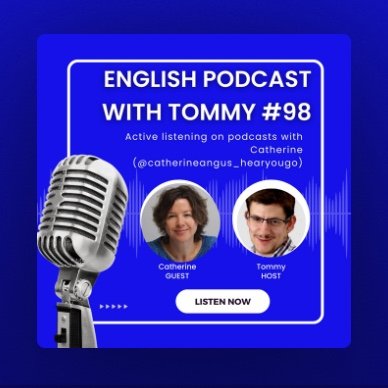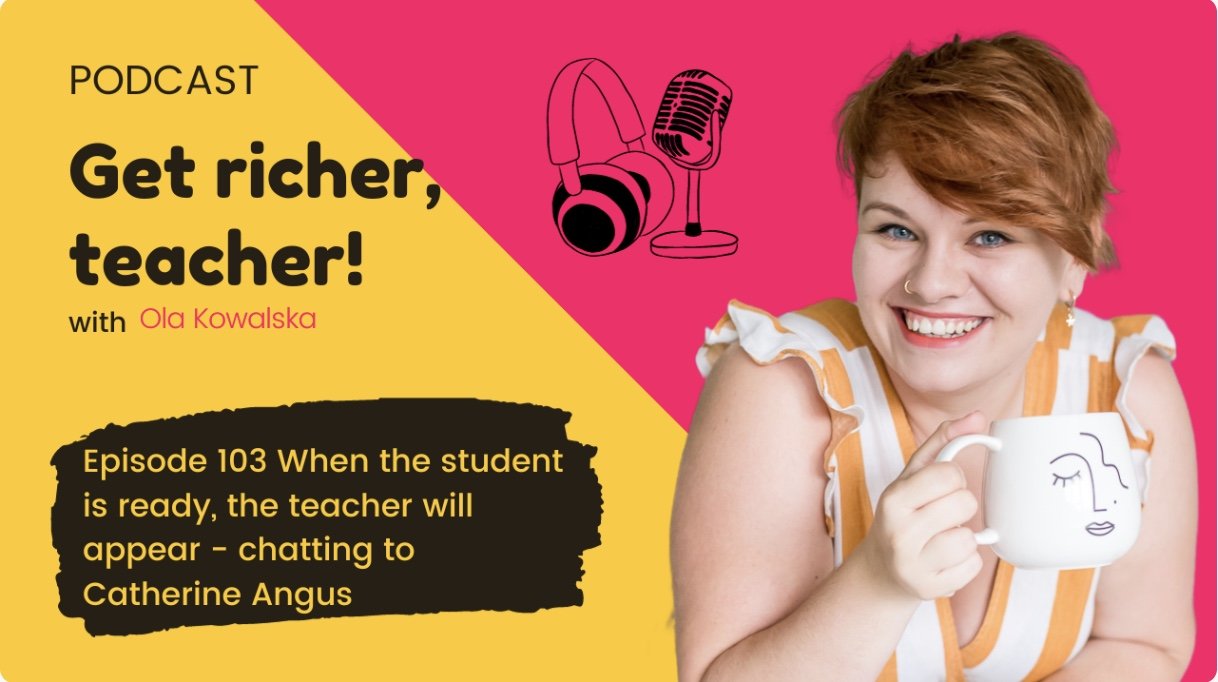Hello and welcome to Hear You Go podcast.
Watch to learn more about this incredible resource I make for your listening practice.
Hear You Go podcast is available on all podcast platforms, and is hosted and accessible on Podbean.com.
I've just had the loveliest conversation with one of my students who has started listening to your podcast. She said it's the perfect combination of of interesting topics and useful language advice.
She also said she finds your voice very soothing. — Sarah Morgan, Meaningful English
Catherine's podcast is for more than learning a new language and new vocabulary, it helps build confidence and fluency through the exploration of spoken English and, yes, listening skills too!” — A fan :)
Just wanted to let you know that I've been catching up with your latest podcast episodes and they all have some sort of a soothing effect on me.
Thank you for creating such a beautiful and unique product for both English teachers and learners! — Another fan!
I really enjoyed listening to this episode! I follow Fernanda on Instagram and she inspires me so much. It was interesting to learn more about her journey in learning English. I can definitely say that after I got help from professionals, my understanding of the language has changed a lot..for better, of course. I used to study only with textbooks and I'd get bored easily.
However, I've learned that learning a new language involves much more than studying with books and the process doesn't have to be boring. Catherine, you have helped me tremendously! — Bruna Dell’Orto, Toronto

A Short Story about Tulips and a Royal Baby | English Listening Practice
Tulips everywhere, in yellow, red, pink, white, orange, and even purple and black. They line the streets and the canal. They attract hundreds and hundreds of people to admire them and post their beauty on Instagram. Where? Right here, in Ottawa, Canada, every May. It’s the annual Tulip Festival and it’s a sight to behold.
The Tulip Festival in Ottawa has historical significance, and I’d like to share that with you today, to share some pride in my city and my country. We’ll take a brief look at what tulips are and where they originate (it’s not Holland), then we’ll explore the importance of tulips in Ottawa and its special tulip history (it involves a princess), and finally, we’ll wrap up by looking at flower festivals and their pros and cons in today’s social media landscape.
English listening challenge:
🛑In this English listening episode, I draw your attention to connected speech specifically. Listen carefully for where words are dramatically reduced and/or connected.

Julia Child: Breaking Bread and Barriers | English Listening PRactice
Who was Julia Child? Why is she important?
If you like to eat, cook, and enjoy cooking shows, join me on a journey into the world of Julia Child, the iconic figure who revolutionized American food culture.
In this episode, we learn about Julia's exciting life story, from her privileged childhood to her adventurous spirit that led her to fall in love with French cuisine in post-war Europe.
We'll explore how Julia's passion for cooking turned into a career that challenged societal norms and inspired millions through her bestselling cookbook, "Mastering the Art of French Cooking," and groundbreaking television show, "The French Chef."
You know, lots of people underestimated her.
They didn't think she had the right to teach cooking.
Don't let anyone ever tell you that you can't learn English.
Don't let anyone discourage you from speaking English your way.
Be like Julia - break barriers!
We'll see that her life and legacy changed the world of food and cooking, and helped advance feminist goals (to a degree). She's had a lasting impact on future generations of cooks and food enthusiasts that I hope to champion today. Bon appétit!

The Elegance of English, with Maria Glazunova | Intermediate English Conversations
The elegance of English.
I'd never thought of English that way, but my guest, Maria Glazunova, explains why English has such an emotional hold her on. It's a beautiful English conversation we have for you today.
Maria and I talk about:
her history with English: learning and teaching it
burnout and how that led her to adopt a dogme approach to teaching English
how her book literally saved her life
how she uses a reactive teaching approach with tech professionals
how my English pronunciation course helped her better diagnose her clients' problems, and empowered her to teach pronunciation
Whether you're learning English or you're an English language teacher, or both, this episode is going to offer you plenty to think about, in addition, as usual, to lots of interesting language and messy, delightful, imperfect spoken conversational English.
And if what you hear from Mary about my Pronunciation for Teachers course makes you curious, be sure to contact me ASAP. The course is offered twice a year. Learn more about it here: Pronunciation for Teachers.

On turning 55 | English Listening Practice
In about a week, I'm going to celebrate my 55th birthday. I remember when I once thought that was old. Hahaha!!! In honour of my 55th birthday, I want to share some thoughts on aging, specifically aging as a woman:
what it means to get old and look old (smashing the beauty myth!)
the very real possibility of losing mental agility
research that suggests age is a mindset, not a number
I believe to my core that getting older is not something we should take for granted: it’s a privilege and should be welcomed and celebrated.
So come celebrate with me as I step through the door on my way to 60. I'm not rushing to get there, but I AM hoping to get there!
Looking forward to hearing your thoughts on all this :)
English listening challenge:
This episode is chock-full of idioms and common collocations - listen for them. How many can you find? Which do you know? Which ones can you use this week in your language practice?
Thanks for listening,



